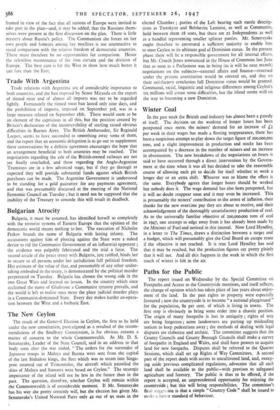The New Ceylon
The result of the General Election in Ceylon, the first to be held under the new constitution, promulgated as a resulted of the recom- mendations of the Soulbury Commission, is for obvious reasons a matter of concern to the whole Commonwealth. As Mr. D. S. Senanayake, Leader of the State Council, said in an address to that body soon after the war ended, "The orders for the surrender of Japanese troops in Malaya and Burma were sent from the capital of the last Sinhalese kings, the fleet which was to steam into Singa- pore steamed out of Trincomalee, the aircraft which patrolled the skies of Malaya and Sumatra were based on Ceylon." The strategic importance of the island will not be less in the future than in the past. The question, therefore, whether Ceylon will remain within the Commonwealth is of considerable moment If Mr. Senanayake has his way she pretty certainly will, but the election has given Mr. Senanavake's United National Party only 42 out of 9s seats in the
elected Chamber ; parties of the Left bearing such exotic descrip- tions as Trotskyist and Bolshevist Leninist, as well as Communist, hold between them x8 seats, but there are at Independents as well as a handful representing smaller splinter parties. Mr. Senanayake ought therefore to command a sufficient majority to enable him to steer Ceylon to its ultimate goal of Dominion status. In the present phase there will be a responsible government for all internal affairs, but Mr. Creech Jones announced in the House of Commons last June that as soon as a Parliament was in being (as it will be next month) negotiations on the subjects—external affairs and finance—reserved under the present constitution would be entered on, and that en their satisfactory conclusion full Dominion status would be granted. Communal, racial, linguistic and religious differences among Ceylon's six millions will create some difficulties, but the island seems well on the way to becoming a new Dominion.


































 Previous page
Previous page